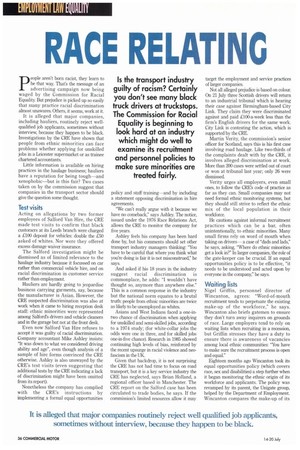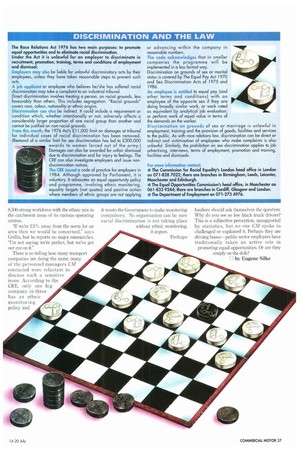RAC RELATING
Page 38

Page 39

If you've noticed an error in this article please click here to report it so we can fix it.
Is the transport industry guilty of racism? Certainly you don't see many black truck drivers at truckstops. The Commission for Racial Equality is beginning to look hard at an industry which might do well to examine its recruitment and personnel policies to make sure minorities are treated fairly.
people aren't born racist, they learn to be that way. That's the message of an advertising campaign now being waged by the Commission for Racial Equality. But prejudice is picked up so easily that many practice racial discrimination almost unawares. Others, it seems, work at it.
It is alleged that major companies, including hauliers, routinely reject wellqualified job applicants, sometimes without interview, because they happen to be black. Investigations by the CRE have shown that people from ethnic minorities can face problems whether applying for unskilled jobs in a Leicester supermarket or as trainee chartered accountants.
Little information is available on hiring practices in the haulage business; hauliers have a reputation for being tough—and xenophobic—but is this fair? Two cases taken on by the commission suggest that companies in the transport sector should give the question some thought.
Test visits
Acting on allegations by two former employees of Salford Van Hire, the CRE made test visits to confirm that black customers at its Leeds branch were charged a £100 deposit for vehicles: double the £50 asked of whites. Nor were they offered excess damage waiver insurance.
The Salford investigation might be dismissed as of limited relevance to the haulage industry because it focussed on car rather than commercial vehicle hire, and on racial discrimination in customer service rather than employment.
Hauliers are hardly going to jeopardise business carrying garments, say, because the manufacturer is Asian. However, the CRE suspected discrimination was also at work when it came to hiring reception desk staff: ethnic minorities were represented among Salford's drivers and vehicle cleaners and in the garage but not at the front desk.
Even now Salford Van Hire refuses to accept it was guilty of racial discrimination. Company accountant Mike Ashley insists: "It was down to what we considered driving ability and age", even though analysis of a sample of hire forms convinced the CRE otherwise. Ashley is also unswayed by the CRE's test visits (even suggesting that additional tests by the CRE indicating a lack of discrimination might have been omitted from its report).
Nonetheless the company has complied with the CRE's instructions by implementing a formal equal opportunities policy and staff training—and by including a statement opposing discrimination in hire agreements.
"We can't really argue with it because we have no comeback," says Ashley. The notice, issued under the 1976 Race Relations Act, allows the CRE to monitor the company for five years.
Ashley feels his company has been hard done by, but his comments should set other transport industry managers thinking: "You have to be careful that where you think what you're doing is fair it is not misconstrued," he says.
And asked if his 18 years in the industry suggest racial discrimination is commonplace, he adds: "I wouldn't have thought so, anymore than anywhere else." This is a common response in the industry but the national norm equates to a brutal truth: people from ethnic minorities are twice as likely to be unemployed as whites Asians and West Indians faced a one-intwo chance of discrimination when applying for unskilled and semi-skilled jobs, according to a 1974 study; (for white-collar jobs the odds were one in three, and for skilled jobs one-in-five chance). Research in 1985 showed continuing high levels of bias, reinforced by the recent upsurge in racial violence and neofascism in the UK.
Given that backdrop, it is not surprising the CRE has not had time to focus on road transport, but it is a key service industry the CRE has neglected, says Brian Holland, a regional officer based in Manchester. The CRE report on the Salford case has been circulated to trade bodies, he says. If the commission's limited resources allow it may target the employment and service practices of larger companies Not all alleged prejudice is based on colour. On 21 July three Scottish drivers will return to an industrial tribunal which is hearing their case against Birmingham-based City Link. They claim they were discriminated against and paid £100-a-week less than the firm's English drivers for the same work. City Link is contesting the action, which is supported by the CRE.
Martin Verity, the commission's senior officer for Scotland, says this is his first case involving road haulage. Like two.thirds of the complaints dealt with by the CRE, it involves alleged discrimination at work. More than 200 cases were settled out of court or won at tribunal last year; only 26 were dismissed.
Verity urges all employers, even small ones, to follow the CRE's code of practice as far as they can. Small companies may not need formal ethnic monitoring systems, but they should still strive to reflect the ethnic mix of the local population in their workforce.
He cautions against informal recruitment practices which can be a bar, often unintentionally, to ethnic minorities. Many small firms rely on word of mouth when taking on drivers— a case of "dads and lads," he says, asking, "Where do ethnic minorities get a look in?" In larger companies, the role of the gate-keeper can be crucial. If an equal opportunities policy is to be effective, "it needs to be understood and acted upon by everyone in the company," he says.
Waiting lists
Nigel Griffin, personnel director of Wincanton, agrees: "Word-of-mouth recruitment tends to perpetuate the existing make-up of the workforce," he says. Wincanton also briefs gatemen to ensure they don't turn away inquirers on grounds of race. Large employers tend to rely on waiting lists when recruiting in a recession, but Griffin stresses they have a duty to ensure there is awareness of vacancies among local ethnic communities: "You have to make sure the recruitment process is open and equal."
Eighteen months ago Wincanton took its equal opportunities policy (which covers race, sex and disabilities) a step further when it began monitoring the ethnic origin of its workforce and applicants. The policy was revamped by its parent, the Unigate group, helped by the Department of Employment. Wincanton compares the make-up of its 8,500-strong workforce with the ethnic mix in the catchment areas of its various operating centres.
"If we're 2.5% away from the norm for an area then we would be concerned," says Griffin, but he reports no major mismatches. "I'm not saying we're perfect, but we've got our eye on it."
There is no telling how many transport companies are doing the same; many of the personnel managers CM contacted were reluctant to discuss such a sensitive issue. According to the CRE, only one big company in three has an ethnic in policy and it wants the Government to make monitoring compulsory. No organisation can be sure racial discrimination is not taking place without ethnic monitoring, it argues.
Perhaps hauliers should ask themselves the question: Why do you see so few black truck drivers? This is a subjective perception, unsupported by statistics, but no one CM spoke to challenged or explained it. Perhaps they are driving buses—public sector employers have traditionally taken an active role in promoting equal opportunities. Or are they simply on the dole?
LI by Eugene Silke




























































































